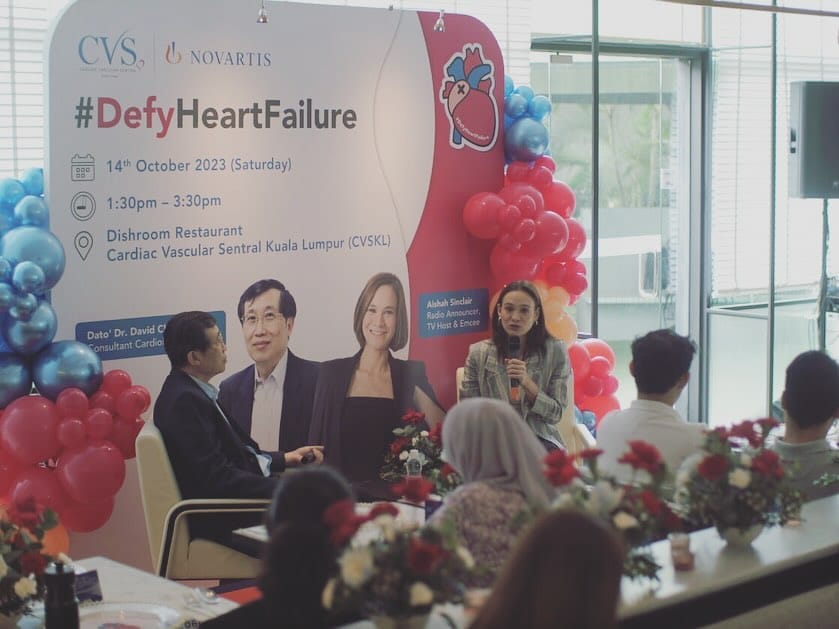Recently, WORLD OF BUZZ had a chance to attend an event with popular Malaysian radio announcer, television host and emcee, Aishah Sinclair, as part of the #DefyHeartFailure campaign initiated by Cardiac Vascular Sentral Kuala Lumpur (CVSKL) and Novartis.
After personally experiencing a huge loss due to a heart-related disease, Aishah has been vocal about prioritising heart health which prompted her to join this campaign in order to encourage Malaysians to spread awareness on the topic through social media.
At the event, we were also joined by the Consultant Cardiologist from CVSKL, Dato’ Dr. David Chew, where he and Aishah engaged in a discussion about heart failure and how to prevent it during the campaign launch. Here’s what we learned:
1. What is heart failure and is it the same as a heart attack?

Many Malaysians think heart failure is the same as a heart attack but in reality, it is not the same:
- HEART ATTACK: A medical emergency that occurs when there is a blockage in the coronary arteries. It usually happens suddenly and can be fatal.
- HEART FAILURE: A chronic condition where the heart is unable to pump blood effectively to meet the body’s demand for oxygen. It can gradually get worse, which means patients may require life-long treatment. It can also be a side effect of other heart diseases (i.e. heart attack, heart muscle disease, etc.) or critical illnesses such as diabetes.
2. What are the symptoms that we should look out for?

Like many other critical conditions, early detection is crucial to effectively manage heart failure. Thus, it is important to look out for common symptoms, such as:
- Shortness of breath: People often mistake this symptom for being unfit but this can be a sign that your heart is struggling to pump blood effectively.
- Swelling in the ankles: This is caused by water retention. The water can accumulate in the lungs, causing slight difficulty in breathing when you’re lying down and the water will then trickle down to the legs when you’re standing up, causing swelling in the ankles.
- Severe coughing: This is also caused by water retention whereby water can be gathered in the lungs.
3. Are there ways to prevent heart failure?

To avoid heart failure, Malaysians can consider a few lifestyle modifications, such as:
- Avoiding foods high in salt and sugar
- Keeping a healthy weight
- Exercising regularly
- Ensuring your cholesterol levels and blood pressure readings are good
Speaking to Dr. Chew, he emphasises the importance of a health screening, especially for adults over 40 who are more at-risk. So, if your parents have not had the chance to get a full check-up, consider this a reminder to bring them for one soon!
You can also consider gifting them a full health check-up, like the one available at CVSKL, where they will assess your parents’ overall well-being to detect any critical illnesses they might have.
4. What treatments are available and is a full recovery possible?

In order to treat heart failure, the most important thing is to know the cause. If an artery blockage causes your heart disease, surgery would be required to remove it. On the other hand, if your heart is enlarged due to stress, it needs to be treated with medications.
Lifestyle modifications also apply to heart failure patients who wish to manage their conditions and improve their quality of life. Apart from weight monitoring, patients are also advised to limit their fluid intake to avoid water retention in the body. Additionally, stress management and a heart-healthy diet are also crucial as patients should try to maintain a normal level of blood pressure and cholesterol.
On top of that, Dr. Chew recounted that many patients have also successfully reversed their heart failure symptoms by following their prescribed medications:
- A patient with an enlarged heart and water retention: Both symptoms were completely alleviated through medication
- Another patient with a low ejection fraction (a measurement of the blood percentage leaving the heart with each contraction): Through consistent medication and a few lifestyle modifications, his ejection fraction improved from 20% to around 50% (the normal range is between 50% and 70% for males, anything lower can be a sign of heart failure)
This proves that heart failure symptoms can be reversed and patients can live a healthy, normal life! However, Dr. Chew also noted that patients are usually required to consume these medications for life. Stopping them can lead to symptom recurrence.
5. The importance of spreading awareness through the #DefyHeartFailure initiative

In Malaysia, it is estimated that one in five adults over the age of 40 may be affected by heart failure. This means the disease may be more common than we think but sadly, this topic is not talked about enough by Malaysians.
If you’re wondering what you can do to help the cause, why not start by spreading awareness about this topic? It is absolutely crucial to get the conversation going, especially because heart disease is the global leading cause of death.
One way to do this is by taking part in initiatives like the #DefyHeartFailure online campaign that encourages Malaysians to get everyone talking about this topic.
This online campaign also provides a platform for Malaysians to share their stories of dealing with heart failure. For instance, Aishah Sinclair shared her own experience of going to a health screening with her mother at CVSKL.
View this post on Instagram
View this post on Instagram
When discussing her experience, she mentioned that her late brother’s untimely passing has always been in the back of her mind and it motivated her to finally bring her mother and herself for a check-up. They found out that her mother’s heart is enlarged – one of the early symptoms of heart failure.
She went on to say that she is grateful to have brought her mother for the check-up because now, she could seek proper treatment and take better care of her heart health. Aishah also mentioned that this experience taught her the importance of early detection and she will continue to urge the rest of her family members to go for their own screenings as well.

We hope Aishah’s story inspires you to start taking better care of your heart health as well as your family’s. You can check out CVSKL’s website here to know more about the #DefyHeartFailure campaign and to learn about this serious condition.
If you’re interested in bringing your parents for a check-up, you can learn all about the comprehensive health screening options available via the CVSKL website. There are several packages to choose from and you can also see what each package will cover. You can also make an appointment at this website for your parents to see a specialist to get a proper consultation.
Don’t forget to also share your own stories about heart failure so you can help inspire others the way Aishah has. Who knows, you might motivate other Malaysians to send their loved ones for a health screening before it’s too late!
And don’t forget to follow CVSKL on Instagram and Facebook so that you can stay updated with the #DefyHeartFailure movement.




































